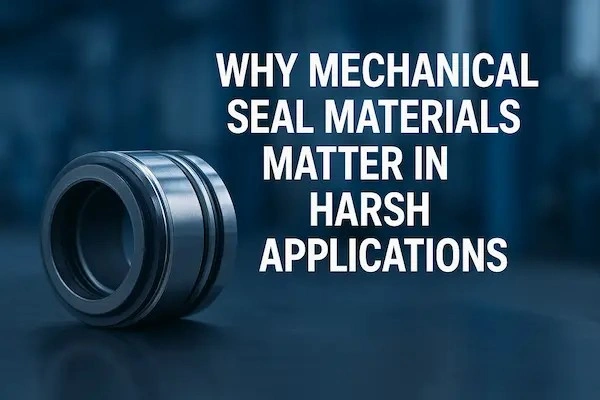Posted At: Oct 15, 2025 - 531 Views

Why Mechanical Seal Materials Matter in Harsh Applications
In industrial processes, ensuring the reliability and efficiency of equipment is critical. One of the unsung heroes in this scenario is the mechanical seal. Mechanical seals prevent leakage of fluids in pumps, mixers, and other rotating equipment. However, not all mechanical seals are created equal — the materials used in mechanical seals can significantly impact their performance, especially in harsh applications. Choosing the right material ensures longevity, safety, and operational efficiency.
What Are Mechanical Seal Materials?
Mechanical seals are composed of multiple components — typically a rotating ring, a stationary ring, secondary seals like O-rings, and springs. Each of these components can be made from a variety of materials such as:
Carbon: Offers good self-lubrication and chemical resistance. Ideal for general-purpose applications.
Ceramics: Highly resistant to wear and corrosion. Suitable for abrasive or chemically aggressive fluids.
Silicon Carbide: Extremely hard, excellent for high-speed and high-temperature applications.
Tungsten Carbide: Best for severe wear conditions and abrasive environments.
Stainless Steel: Commonly used for metal parts due to corrosion resistance.
Elastomers (Viton, EPDM, Nitrile): Provide sealing flexibility and chemical resistance.
Each material brings its strengths and limitations, making the selection process crucial for harsh industrial applications.
Why Material Selection Is Critical in Harsh Applications
Harsh applications — like chemical processing, petrochemicals, and slurry handling — expose mechanical seals to extreme conditions. These conditions can include:
- High temperatures
- Aggressive chemicals
- High pressures
- Abrasive particles
- Dry running or vapor presence
Selecting inappropriate materials can lead to premature seal failure, leakage, downtime, and costly maintenance. On the other hand, the right combination of materials can ensure long service life, energy efficiency, and operational safety.
Key Considerations for Mechanical Seal Materials
When choosing mechanical seal materials for harsh applications, industries typically evaluate:
1. Chemical Compatibility
Mechanical seals must resist the chemical properties of the fluids they are sealing. For example:
Viton elastomers resist strong acids, oils, and solvents.
EPDM is ideal for water-based chemicals but not for hydrocarbons.
Checking chemical compatibility prevents material degradation and leakage.
2. Temperature Resistance
High-temperature operations demand materials that retain their strength and integrity:
Silicon carbide and tungsten carbide handle extreme heat without warping.
Carbon and ceramic rings are suitable for moderate high temperatures.
3. Wear and Abrasion Resistance
Applications with slurry, particulates, or abrasive chemicals need seals that can withstand wear:
Tungsten carbide and silicon carbide are top performers.
Regular maintenance and inspection can extend seal life in abrasive environments.
4. Pressure Handling
High-pressure pumps require materials that can maintain structural integrity without cracking or deforming. Metals like stainless steel for seal holders combined with hard faces like silicon carbide or tungsten carbide are ideal.
5. Environmental Factors
External factors like vibration, shaft misalignment, and temperature fluctuations also influence material selection. Elastomers, for example, provide flexibility to accommodate minor misalignments.
Emerging Material Trends in Mechanical Seals
With advancing industrial requirements, mechanical seal manufacturers are innovating new materials and coatings to enhance performance:
Advanced Ceramics: New composites offer superior corrosion and wear resistance.
Hybrid Seals: Combining carbon, ceramic, and silicon carbide faces to balance performance and cost.
Coated Metals: Hard coatings on stainless steel enhance abrasion resistance.
Fluoroelastomers: Enhanced chemical resistance for extreme chemicals and high temperatures.
These innovations are shaping the future of mechanical seal technology, allowing operators to handle more aggressive fluids and higher pressures safely.
Benefits of Choosing the Right Mechanical Seal Materials
Extended Seal Life: Reduces maintenance and replacement costs.
Leak Prevention: Ensures environmental safety and regulatory compliance.
Operational Efficiency: Minimizes downtime and energy loss.
Cost Savings: Reduces the risk of catastrophic failures in pumps and equipment.
Safety Assurance: Protects personnel and equipment from hazardous leaks.
Common Applications of Mechanical Seals in Harsh Environments
Chemical and Petrochemical Plants: Handling acids, alkalis, and solvents.
Oil & Gas Industry: High-pressure, high-temperature processes.
Pulp & Paper: Abrasive slurries requiring wear-resistant seals.
Food & Pharma: Corrosion-resistant seals in cleaning-in-place systems.
Mining & Mineral Processing: Slurry pumps and abrasive environments.
Conclusion
In harsh industrial applications, mechanical seal materials are not just a component choice — they are a critical factor in operational reliability and efficiency. Selecting the right materials ensures long-lasting performance, leak prevention, and reduced maintenance costs. By investing in high-quality mechanical seals and understanding the importance of material selection, industries can achieve safer, more efficient, and cost-effective operations.
Frequently Asked Questions
1. What are the most durable materials for mechanical seals?
Silicon carbide, tungsten carbide, and ceramics are among the most durable materials for harsh applications.
2. Can elastomers be used in high-temperature processes?
Yes, but only specialized elastomers like Viton are suitable for elevated temperatures.
3. How often should seals be inspected in harsh applications?
Depending on the fluid and operating conditions, inspections should be done every 3–6 months.
4. Is it better to use a hybrid material seal or single material?
Hybrid materials often provide a balance of cost, durability, and performance, making them ideal for extreme conditions.
5. Where can I get high-quality mechanical seals in India?
QMSeals offers a wide range of mechanical seals tailored for harsh applications across industries.


